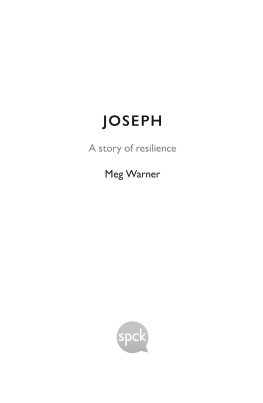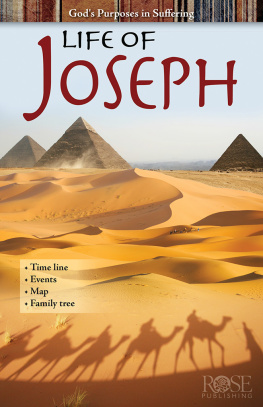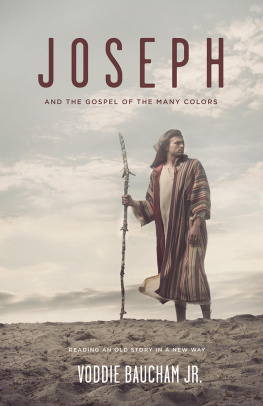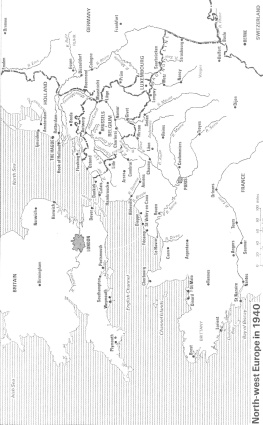Contents
Pagination de l'dition papier
Guide
Meg Warner moves us on from Lloyd Webbers Poor, poor Joseph to meet a man trafficked and traumatised, by no means perfect, but for us a lesson in building resilience. Tracing her own story, which includes being limited by illness and finding work in a new country, Warner draws on biblical scholarship and research into trauma and resilience.
This book is written in both a down to earth and intelligent way, so that we weave our story, the authors and Josephs with contemporary issues, and consider how we have come through difficulties and can become more resilient in the future.
Justine Allain Chapman, Archdeacon of Boston, England, and author of The Resilient Disciple
Meg Warner brings together a depth of biblical knowledge and a strong understanding of contemporary research on the impact of trauma on individuals and communities in her exploration of the story of the well-known biblical character of Joseph. She invites her readers into a deeper understanding of the way that the trauma of the ancient Israelite community is reflected in the Bible, and shows how this story continues to resonate with our own experiences of pain and suffering.
Along the way she shares her own story and invites us into a reflection of our own experiences, taking her reader on a journey of exploration without falling into the trap of prescribing the outcome. The book is carefully written and astute, full of compassion, hope and sensitivity. A great read for individuals wanting to explore issues of trauma and its impact, this book is also an invaluable resource for groups.
Liz Boase, Dean of the School of Graduate Research, University of Divinity, Australia, and co-editor of Bible Through the Lens of Trauma
This book is electric. Meg Warner has that rare knack of using personal story to bring the biblical story to life. At every step she draws us in, challenging us to allow the biblical story, in turn, to bring us to life. It makes for compulsive reading.
Nicholas Holtam, Bishop of Salisbury
With characteristic deftness, disarming honesty and exegetical skill, Meg Warner makes the story of Joseph a parable for our lives and our times.
Sam Wells, Vicar of St Martin-in-the-Fields, Trafalgar Square, London
First published in Great Britain in 2020
Society for Promoting Christian Knowledge
36 Causton Street
London SW1P 4ST
www.spck.org.uk
Copyright Meg Warner 2020
All rights reserved. No part of this book may be reproduced or transmitted in any form or by any means, electronic or mechanical, including photocopying, recording, or by any information storage and retrieval system,
without permission in writing from the publisher.
SPCK does not necessarily endorse the individual
views contained in its publications.
British Library Cataloguing-in-Publication Data
A catalogue record for this book is available from the British Library
ISBN 9780281081080
eBook ISBN 9780281081097
Typeset by Nord Compo
First printed in Great Britain by Jellyfish Print Solutions
Subsequently digitally printed in Great Britain
eBook by Nord Compo
Produced on paper from sustainable forests
This digital document has been produced by Nord Compo.
Meg Warner is Tutor in Old Testament at Northern College, Manchester. She is a Reader in the Church of England, a regular guest speaker at synods, festivals and other church gatherings around the UK and internationally, and (writing as Megan Warner) author and editor of several books, most recently Re-Imagining Abraham: A Re-Assessment of the Influence of Deuteronomism in Genesis (Brill, 2018), Confronting Religious Violence: A Counter-Narrative (with Richard A. Burridge and Jonathan Sacks, Baylor, 2018) and Tragedies and Christian Congregations: The Practical Theology of Trauma (Routledge, 2020). Joseph: A story of resilience is the follow-up to her highly successful Lent book, Abraham: A journey through Lent (SPCK, 2015).
For Christopher Southgate, Hilary Ison and Carla Grosch-Miller,
with thanks for recruiting me, and then being recruited in return.
And for Ian Markham. He knows why.
Acknowledgements
One of the ways of being resilient through a crisis, Ive discovered, is to write a book about it. Having this book already in the pipeline has been, quite literally, a godsend at one of the most challenging times of my life.
Thank you to Philip Law and his fabulous team at SPCK for continuing to believe in me and for being patient when it all started to take just a little longer than originally planned.
Id also like to thank the Templeton World Charities Trust. Although this book is not one of their sponsored projects, it would never have come about without their support of the Tragedies and Congregations Project, based at the University of Exeter and led by the amazing Christopher Southgate. It was on this project that I learned about trauma and found myself being edged, just in time, towards an interest in resilience. Chris, Hilary and Carla were the best colleagues in that project that I could possibly have hoped for, and I owe all three of them a great deal.
Once again, I want to express my thanks to the staff and students of Virginia Theological Seminary and especially Ian and Lesley Markham. They dont all know that theyre lifesavers, but they are.
Many people have been praying for and being friends to R. and me while I have been writing this book, and I am thankful for every one of them. Some of them have been Polly and Adrian, Sarah and Carl, John-Francis, Nigel and Stephen, the gals of SNOG, Judi, Martin, Susannah, Justin, Gordon, Rowan, Nick, Gilly and Dunc, Jonathan, Steve, Ed, John and Jenny. There have been others. Thank you; you got us through.
Others have been influential during various stages of writing this book, and Id like to thank all those at St Lukes West Holloway who signed up to come to my Joseph Lent group, as well as the members of my Oxford Summer School class in August 2019, for highly stimulating and challenging conversation.
So I think that just leaves R., without whom this book would have got to the publishers on time. But without whom there wouldnt have been a book. Shalom, my love.
A Note from the Author
Books tend, by their nature, to be written at particular times and in particular contexts. Because the writing, editing, proofing and production stages of books happen across extended periods, the contexts in which they are finally published can be markedly different from those pertaining during the writing phase. That is the case for Joseph: A story of resilience. While I was writing the original drafts, years ago now, Brexit was still a pipe dream and none of us imagined the political landscape that we now see all around us. Later, in the editing stages, Brexit happened, and I was able to refer to it along the way. Brexit seemed, then, to be the greatest challenge to have struck the UK for many decades. Today, however, as this book enters its final stages of publication, the UK has very suddenly been hit by the realities of the Coronavirus pandemic, and they threaten to overshadow Brexit dramatically.
There are many, many new things, and fears, to get our individual and collective heads around. One of the strangest is the idea that the way we can best support and care for one another is to keep our distance. That idea goes against everything we have been conditioned to believe. We are, however, going to have to re-frame much of what we have been conditioned to believe, or to assume, in the wake of this virus. (I talk about the process of re-framing in Chapter Three.)











